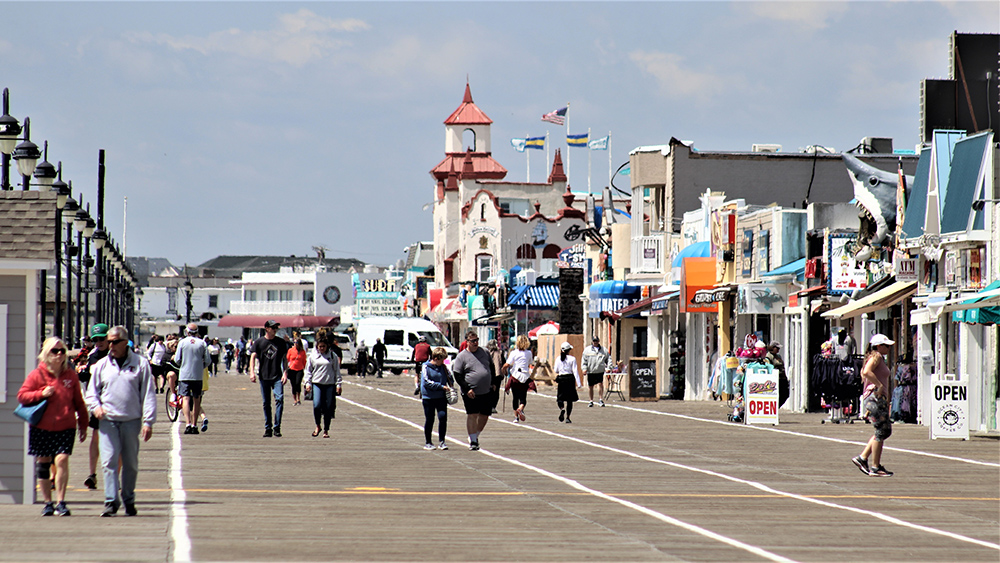By Bill Barlow
The bad economic news is hardly news at all. The pandemic hit the national economy hard, with the hospitality industry that shore towns depend on hurt more than most. In South Jersey, the nation and the world, the disruption has been enormous.
But there are reasons for optimism, Oliver Cooke told a recent meeting of the Cape May County Chamber of Commerce. He is and associate professor of economics at Stockton University and a policy scholar at the William J. Hughes Center. On April 29, he spoke to local business leaders. Like so much else for more than a year, the event was held remotely.
“I thought it might be helpful to start with the good news,” Cooke said. Clear evidence is beginning to accumulate: “The US economy looks set for a strong rebound in 2021.”
Locally and nationally, the economy is adding jobs quickly. New unemployment claims are down. He said the numbers have been heading in the right direction over the last several months, although the overall number of jobs remains shy of figures from February of 2020, just before the bottom fell out.

People are saving more money, he said.
Both business owners and Cooke report that pre-season bookings appeared brisk for the winter and spring. Those who remained employed, or those who received enhanced unemployment insurance benefits and the federal stimulus, have some extra money and are tired of lockdown days and Zoom meetings and are ready for a trip.
Many remain reluctant to fly or visit major cities, he added, which could buoy regional vacation destinations and shore sites. By early July, estimates are that 80% of the population will be vaccinated against COVID-19.
Cooke cited a question that remains: Will people be comfortable eating in restaurants, waterparks, shopping or attending crowded events?
“A lot of this is going to depend, as it always has, on consumer comfort,” he said.
Cooke expressed concern with the impact of new strains of the virus, calling the situation in India a human tragedy, and said both the housing market and the equity market are extremely high right now.
Also, with a growing economy, will there be people to do the work?
During the video meeting, business owners said there are help wanted signs lining the Boardwalks. One owner said he was already at $15 an hour and will likely need to increase wages to attract qualified applicants.
“I hear restaurants are offering $20 an hour and not getting any applicants,” said Doug Burke, the chairman of the chamber’s Board of Directors who led the meeting.
“You have hotels that normally have 200 people that have 50 people. How can they keep up with that?” Burke said.
Cooke raised the specter of increasing wages driving inflation, and some of the business owners cited the federal money enhancing unemployment insurance as reducing the numbers of people looking for jobs.
Last summer, a federal program allowing workers to visit from overseas under what’s known as a J-1 visa was all but shut down. Those workers from around the world make up a significant percentage of the summer workers in shore towns. For this year, the program is back but will likely experience delays and limitations.
Some workers are also reluctant due to fear of the virus, particularly in industries like hospitality that require face-to-face interaction with consumers. There are many who found work in other sectors, he added, as tourism jobs dried up. With Amazon and other major retailers paying $15 an hour, it may be more difficult to fill a summer job.
According to Cooke, without that additional weekly payment boosting confidence and stabilizing household spending, the pandemic-driven recession would likely have been far worse. When you think about the collapse of the job market, he said, without the additional federal spending there would have likely been an even bigger drop in consumer spending.
Around the country, job losses were far worse than in the great recession of just over a decade ago, Cooke reported. Locally, the leisure and hospitality jobs saw the biggest drop, down by about one half from 2019 to 2020.
Cape May County jobs have seen a comeback, he said.
“County labor force has actually climbed back above where we were pre-pandemic, which is really quite remarkable in many ways,” Cooke said. “This is not the same as in Atlantic County. Right now, Atlantic County’s labor force remains below where it was pre-pandemic.”
The casino take at the brick-and-mortar locations was devastated, he said, with a loss of about $1 billion, or about half the total from before the pandemic.
Businesses also have a returning confidence, up to a point. According to Cooke’s presentation, nearly 46% of small businesses surveyed believe it will take six months or more to return to normal operations, compared to 37% nationally. A smaller number, 8.5%, don’t believe it will ever return. Just under 3% of businesses in New Jersey closed for good last year, a rate higher than the national average.
Housing prices have been a bright spot in the local economy, he said, with values rising rapidly in Cape May County. That is a long-term trend, according to figures presented by Cooke, and multiple industry insiders say single-family homes are moving fast, often at above the asking price.






